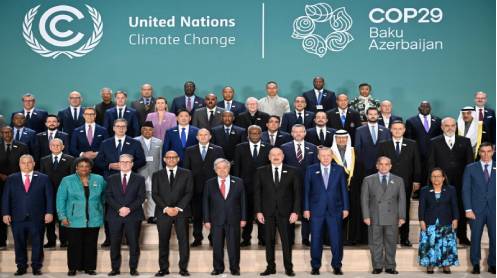At the COP29 World Leaders Climate Action Summit in Baku, Azerbaijan, Prime Minister Shehbaz Sharif called for a global overhaul in climate financing, urging that debt-based funding should no longer be the norm. Addressing the Climate Finance Round Table Conference, organized by Pakistan, PM Shehbaz highlighted the need for innovative, debt-free financing solutions to support developing countries in combating climate change without increasing their financial burdens.
“We stand at a crucial threshold where the global climate finance framework must be redefined to meet the urgent needs of vulnerable nations,” he asserted. He cautioned that financing through loans only exacerbates existing economic strains on developing countries, placing them in what he described as “mounting debt traps” or “death traps.” Instead, he emphasized non-debt financing mechanisms, underscoring that sustainable climate initiatives must not come at the expense of a country’s financial health.
The Prime Minister further noted the gap between climate funding commitments and the actual needs of developing nations. He stressed that while developing countries require around $6.8 trillion by 2030 to fulfill their Nationally Determined Contributions (NDCs), they continue to face barriers due to unmet funding commitments. He called upon wealthier nations to honor their commitment to allocate 4.7% of their gross national product (GNP) towards climate support, urging the immediate mobilization of the annual $100 billion climate pledge.
PM Shehbaz’s speech also touched on Pakistan’s climate vulnerability, citing devastating floods and record-high heat waves as examples of the country’s ongoing climate challenges. In 2022, catastrophic floods impacted a third of Pakistan, displacing 33 million people and causing damages estimated at $30 billion. More recently, a severe heatwave disrupted health services and agricultural production. He argued that countries like Pakistan, which are among the top 10 most climate-vulnerable according to the Global Climate Risk Index, need more than temporary solutions—they need transparent, substantial, and accessible financial commitments.
The Prime Minister further called for a reform in international financial architecture to enable equitable climate finance mechanisms under the United Nations Framework Convention on Climate Change (UNFCCC). He urged developed nations to increase their emission reductions, reflecting a shared responsibility in global climate efforts.
In addition to addressing the Climate Finance Round Table, PM Shehbaz will participate in the “Glaciers 2025: Actions for Glaciers” event organized by Tajikistan’s President, focusing on glacier preservation. He also held discussions on climate cooperation and mutual interests with global leaders, including Azerbaijan’s President Ilham Aliyev, Turkey’s President Recep Tayyip Erdoğan, and the UK’s Prime Minister Keir Starmer. These meetings underscore Pakistan’s commitment to fostering regional and international partnerships to address climate change collectively.
As COP29 unfolds, world leaders are debating key issues such as climate finance, adaptation, and loss and damage. However, high-profile absences, including those of Joe Biden, Xi Jinping, Narendra Modi, and Emmanuel Macron, have cast uncertainty over the summit’s potential outcomes. Despite these challenges, PM Shehbaz remains steadfast in his call for ambitious and balanced climate action that prioritizes vulnerable nations.





